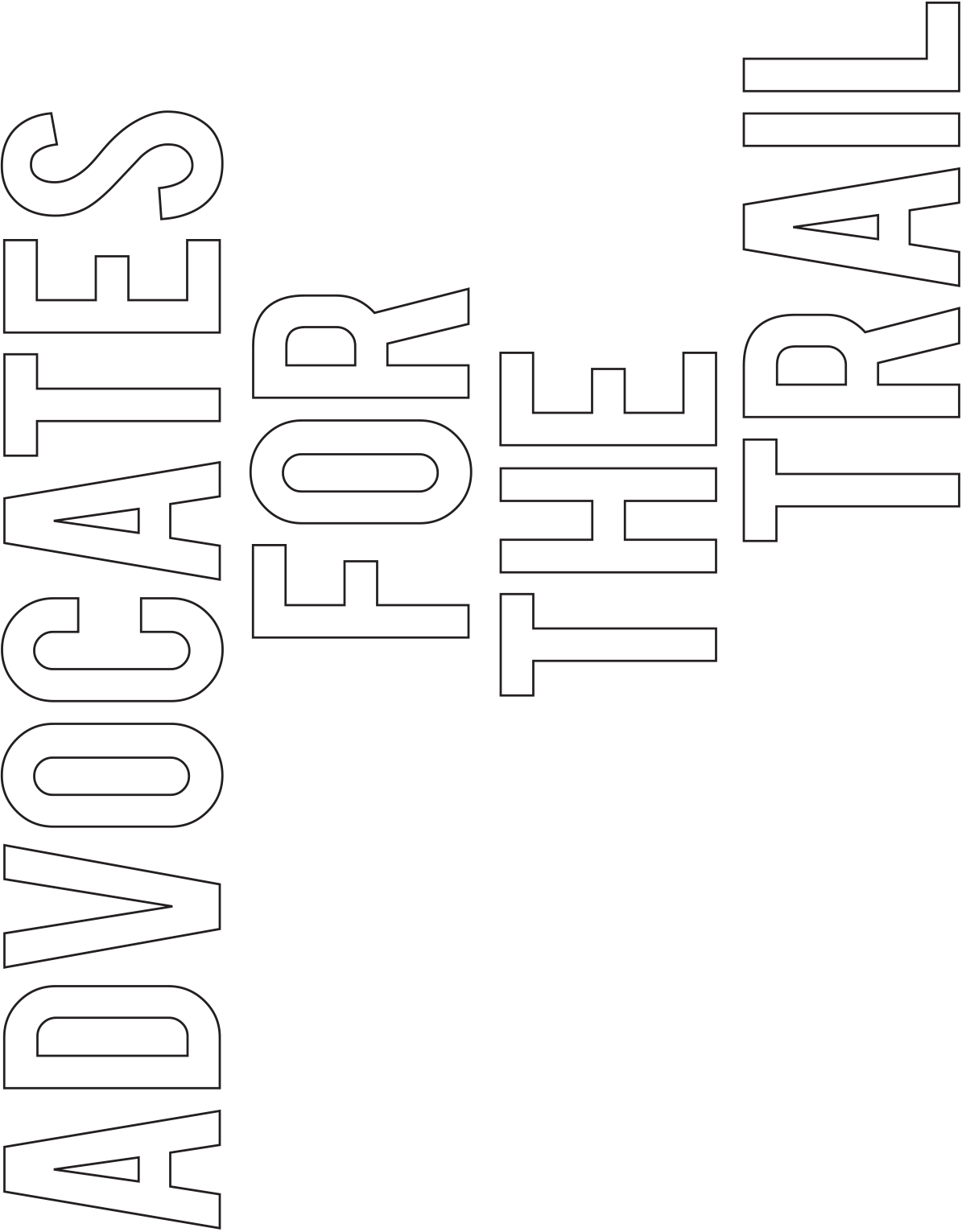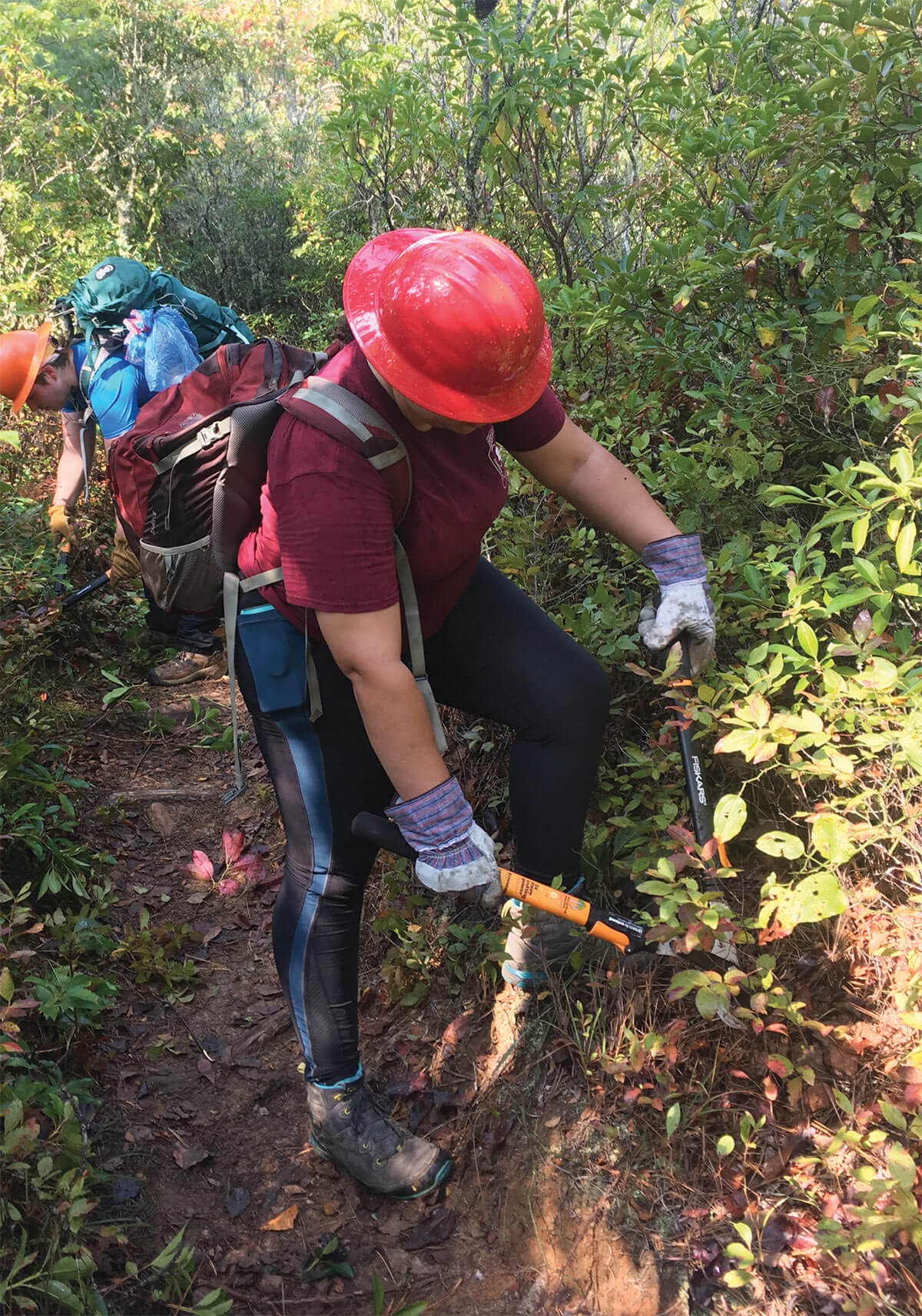
Julie Judkins
THIS IS WHAT WE WANT ringing in young people’s ears and then carried into their communities after they leave one of the Appalachian Trail Conservancy’s (ATC) regional NextGen Summits. The ATC leads these summits in partnership with regional coalitions of youth-serving organizations and land-managing partners. Young people like Greta, Malala, and Jazz are leading movements for change — all rising up for justice and equitable, resilient communities. Young people are rewriting narratives — giving us advice on how to treat one another and how to treat the Earth. Our future depends on the next generation and for them to think, feel, and know that Public Lands are theirs. The Appalachian Trail is theirs. And they need to fight for it, speak for it, understand it, get curious about the management of it, and steward it.
NextGen Summits strengthen community connection to the landscape and create conservation networks to expand employment and stewardship opportunities for young people. This year, the ATC hopes to lead summits in Georgia, North Carolina, Virginia, Massachusetts, and Maine. Each summit has a unique agenda, based on community and partner needs, but all summits provide space for outdoor leadership and skills development, connections with Trail club and community partners, and dialogue around barriers and opportunities. Participants leave with plans of action to make change and be advocates in their communities.
Summits also provide discussion on what problems are seen in participants’ communities, and what the underlying historical and social root causes are. Participants then discuss opportunities, ideas, possibilities, and solutions for change. They collectively talk about what it means to be a steward and what it might look like to share those experiences with family, friends, schools, and community.

THIS IS WHAT WE WANT ringing in young people’s ears and then carried into their communities after they leave one of the Appalachian Trail Conservancy’s (ATC) regional NextGen Summits. The ATC leads these summits in partnership with regional coalitions of youth-serving organizations and land-managing partners. Young people like Greta, Malala, and Jazz are leading movements for change — all rising up for justice and equitable, resilient communities. Young people are rewriting narratives — giving us advice on how to treat one another and how to treat the Earth. Our future depends on the next generation and for them to think, feel, and know that Public Lands are theirs. The Appalachian Trail is theirs. And they need to fight for it, speak for it, understand it, get curious about the management of it, and steward it.
THIS IS WHAT WE WANT ringing in young people’s ears and then carried into their communities after they leave one of the Appalachian Trail Conservancy’s (ATC) regional NextGen Summits. The ATC leads these summits in partnership with regional coalitions of youth-serving organizations and land-managing partners. Young people like Greta, Malala, and Jazz are leading movements for change — all rising up for justice and equitable, resilient communities. Young people are rewriting narratives — giving us advice on how to treat one another and how to treat the Earth. Our future depends on the next generation and for them to think, feel, and know that Public Lands are theirs. The Appalachian Trail is theirs. And they need to fight for it, speak for it, understand it, get curious about the management of it, and steward it.
NextGen Summits strengthen community connection to the landscape and create conservation networks to expand employment and stewardship opportunities for young people. This year, the ATC hopes to lead summits in Georgia, North Carolina, Virginia, Massachusetts, and Maine. Each summit has a unique agenda, based on community and partner needs, but all summits provide space for outdoor leadership and skills development, connections with Trail club and community partners, and dialogue around barriers and opportunities. Participants leave with plans of action to make change and be advocates in their communities.
Summits also provide discussion on what problems are seen in participants’ communities, and what the underlying historical and social root causes are. Participants then discuss opportunities, ideas, possibilities, and solutions for change. They collectively talk about what it means to be a steward and what it might look like to share those experiences with family, friends, schools, and community.
Summits also provide discussion on what problems are seen in participants’ communities, and what the underlying historical and social root causes are. Participants then discuss opportunities, ideas, possibilities, and solutions for change. They collectively talk about what it means to be a steward and what it might look like to share those experiences with family, friends, schools, and community.

In western North Carolina, the ATC works with a coalition, Everybody’s Environment, to share ideas, learn new skills, and work and learn together how to effect institutional change through racially-equitable leadership. The inaugural North Carolina summit, Everybody’s Environment Emerging Leaders (E3 Summit), provided people in their 20s the opportunity to paint blazes and do service during National Public Lands Day, and to dive deep into discussions around barriers like systemic discrimination and about what we can do together to remove these barriers. The group continues to blaze ahead by initiating an E3 Advisory Council to support the coalition partners and to plan ongoing summits.
By inspiring young people through an experience of public lands, we extend the influence and opportunity of new voices for support. The time is here for us to learn from our young people, lift them up, and activate their voices as we advocate for perpetual protection of our lands. Moving forward, our goal is to partner with a wide variety of communities to ensure we provide as many young people as possible opportunities to experience and learn from natural refuges like the Appalachian Trail.
NextGen Summit
IN AN EFFORT TO BUILD A BRIDGE ACROSS THE “adventure gap,” Everybody’s Environment and the Appalachian Trail Conservancy (ATC) came together to host the inaugural E3 Emerging Leaders Summit. The E3 Summit brought together a wildly diverse group of individuals for a weekend full of camaraderie, conservation, and tough conversations.
This wildly diverse group met up in an equally wild setting — Camp Watia. Camp Watia is just a few steps from Wright Gap on the A.T. and it is fully outfitted, passionately staffed, and was the perfect venue for the first E3 Summit. Camp life was so much fun and it was the first “camp” experience for most of us there, myself included. During the course of the E3 Summit we were guided through a carefully-crafted itinerary focused on education, exploration, and open-dialogue. There were also campfires, cookouts, swim sessions, and a star gazing seminar. For National Public Lands Day, we invested our sweat equity into the Appalachian Trail by building steps and water breaks, clearing the hiking corridor, and rehabilitating multiple campsites and fire pits. My absolute favorite part of the experience was getting to paint an iconic A.T. blaze on a unique rock trail marker. The rest of our group updated the six-inch white blazes on trees spaced roughly 1,000 feet apart. I cannot think of a more symbolic display of stewardship than blazing a trail — it was an honor I will never forget.
I am a proud public land owner. I own acreage across the country — majestic mountains, towering volcanoes, crystalline lakes, open prairies, arid deserts, and miles upon miles of coastline. Not to brag, but I also own thousands of miles of trails — my favorite of which stretches all the way from Georgia to Maine. The best part about my property? Regardless of your —insert every adjective on Earth here — you are welcome to visit anytime. After all, this land is your land just as much as it is mine.
NextGen Summit
IN AN EFFORT TO BUILD A BRIDGE ACROSS THE “adventure gap,” Everybody’s Environment and the Appalachian Trail Conservancy (ATC) came together to host the inaugural E3 Emerging Leaders Summit. The E3 Summit brought together a wildly diverse group of individuals for a weekend full of camaraderie, conservation, and tough conversations.
This wildly diverse group met up in an equally wild setting — Camp Watia. Camp Watia is just a few steps from Wright Gap on the A.T. and it is fully outfitted, passionately staffed, and was the perfect venue for the first E3 Summit. Camp life was so much fun and it was the first “camp” experience for most of us there, myself included. During the course of the E3 Summit we were guided through a carefully-crafted itinerary focused on education, exploration, and open-dialogue. There were also campfires, cookouts, swim sessions, and a star gazing seminar. For National Public Lands Day, we invested our sweat equity into the Appalachian Trail by building steps and water breaks, clearing the hiking corridor, and rehabilitating multiple campsites and fire pits. My absolute favorite part of the experience was getting to paint an iconic A.T. blaze on a unique rock trail marker. The rest of our group updated the six-inch white blazes on trees spaced roughly 1,000 feet apart. I cannot think of a more symbolic display of stewardship than blazing a trail — it was an honor I will never forget.
I am a proud public land owner. I own acreage across the country — majestic mountains, towering volcanoes, crystalline lakes, open prairies, arid deserts, and miles upon miles of coastline. Not to brag, but I also own thousands of miles of trails — my favorite of which stretches all the way from Georgia to Maine. The best part about my property? Regardless of your —insert every adjective on Earth here — you are welcome to visit anytime. After all, this land is your land just as much as it is mine.